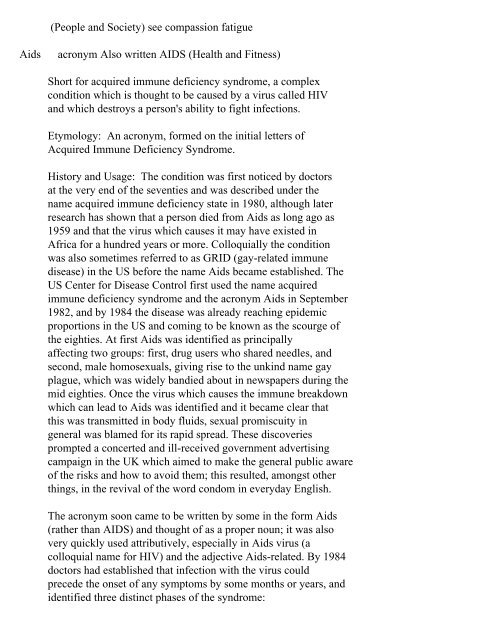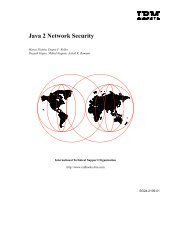- Page 1 and 2: PREFACE Preface The Oxford Dictiona
- Page 3 and 4: other indication of their register.
- Page 5 and 6: subject area, the defining section
- Page 7 and 8: The full and cross-reference entrie
- Page 9 and 10: Full entries HOWTO.1 Cross-referenc
- Page 11 and 12: F 6.0 F 6.1 faction... 6.2 FF 6.3 F
- Page 13 and 14: NMR... 14.4 no-alcohol beer... 14.5
- Page 15 and 16: W 23.0 wack... 23.1 well safe... 23
- Page 17 and 18: people. Etymology: Formed by adding
- Page 19 and 20: 1.3 ace... Just over 30 per cent of
- Page 21 and 22: Spin Oct. 1989, p. 18 Aciiied was a
- Page 23 and 24: are controlled by a computer which
- Page 25 and 26: ather than political activism. This
- Page 27 and 28: 1.4 Adam... already infected with H
- Page 29 and 30: additives, some said in the pollute
- Page 31 and 32: The air-waves of the small, stuffy
- Page 33 and 34: 1.7 ageism patients. By the end of
- Page 35: CU Amiga Apr. 1990, p. 89 -Aid comb
- Page 39 and 40: Christian Science Monitor 2 Mar. 19
- Page 41 and 42: New York Times 7 May 1990, section
- Page 43 and 44: The Times 27 Dec. 1985, p. 12 all-t
- Page 45 and 46: performance; also alternative comed
- Page 47 and 48: anew. Now they call it 'rocket fuel
- Page 49 and 50: animalist° noun (Politics) An anim
- Page 51 and 52: yells Stein, his mouth seeming to m
- Page 53 and 54: ecently. She said there are at leas
- Page 55 and 56: 1.12 arb... for the first syllable
- Page 57 and 58: describe an oil which has some use
- Page 59 and 60: ATB (Lifestyle and Leisure) see mou
- Page 61 and 62: stress mechanisms. Observer 6 May 1
- Page 63 and 64: 1.17 Azeri... That night I freebase
- Page 65 and 66: ecobabble (Environment), environmen
- Page 67 and 68: A technique in music recording in w
- Page 69 and 70: mutually dependent. The Times 16 No
- Page 71 and 72: about in the seventies. Bailouts oc
- Page 73 and 74: mind...Nature is deduced from the h
- Page 75 and 76: in that the producer can bank on a
- Page 77 and 78: In short, putting it bluntly, actua
- Page 79 and 80: The Times 14 Sept. 1987, p. 10 batt
- Page 81 and 82: popularity led to the development o
- Page 83 and 84: After outbreaks of salmonella poiso
- Page 85 and 86: 2.3 bhangra History and Usage: For
- Page 87 and 88:
used in a transferred sense, for ex
- Page 89 and 90:
History and Usage: Bimbo first came
- Page 91 and 92:
component of the environment consis
- Page 93 and 94:
example, are given their distinctiv
- Page 95 and 96:
The Dow Jones, once up 712 points f
- Page 97 and 98:
2.6 BMX. radar: the small bump on a
- Page 99 and 100:
History and Usage: The name boardsa
- Page 101 and 102:
Etymology: Formed by compounding: a
- Page 103 and 104:
Serious damage can mean even more b
- Page 105 and 106:
Police took away...a 'little black'
- Page 107 and 108:
If a computer does not have a hard
- Page 109 and 110:
Goodness, was I going to give her a
- Page 111 and 112:
article also coined the term brat p
- Page 113 and 114:
It seems any moment they will break
- Page 115 and 116:
Etymology: For etymology and histor
- Page 117 and 118:
of buddy, 'friend'. The American fi
- Page 119 and 120:
fifth-in-a-row hit, Danny D's entre
- Page 121 and 122:
widely known since the advent of co
- Page 123 and 124:
Daily Telegraph 30 Oct. 1989, Manag
- Page 125 and 126:
individual country, cable tv has te
- Page 127 and 128:
Callanetics requires only two hour-
- Page 129 and 130:
Etymology: For etymology, see bottl
- Page 131 and 132:
Times Educational Supplement 7 Sept
- Page 133 and 134:
a card (see the last quotation belo
- Page 135 and 136:
City erupt on to the stage. These a
- Page 137 and 138:
forward the idea of caring capitali
- Page 139 and 140:
The Times 25 Apr. 1986, p. 10 cash
- Page 141 and 142:
Politics just aren't that important
- Page 143 and 144:
3.2 CD adjective: Catalysed; fitted
- Page 145 and 146:
3.3 Ceefax... This is a claim that
- Page 147 and 148:
compounds released into the atmosph
- Page 149 and 150:
area of mathematics and physics in
- Page 151 and 152:
A smokeable dollop of heroin costs
- Page 153 and 154:
The Times 16 July 1986, p. 36 Child
- Page 155 and 156:
program--reviewing records of claim
- Page 157 and 158:
this perceived mood of artistic cen
- Page 159 and 160:
3.8 cocooning... personal computers
- Page 161 and 162:
making cohabitation a fact of life
- Page 163 and 164:
p. 5 colourize transitive verb Writ
- Page 165 and 166:
from one area to another, and the a
- Page 167 and 168:
History and Usage: The term complem
- Page 169 and 170:
condom noun (Health and Fitness) A
- Page 171 and 172:
the rebels, even the end of the San
- Page 173 and 174:
Etymology: Formed by compounding; c
- Page 175 and 176:
est known tuber--a potato--reclinin
- Page 177 and 178:
The fact that so many counter-cultu
- Page 179 and 180:
established as the usual term, both
- Page 181 and 182:
Environment, is today expected to w
- Page 183 and 184:
inexplicably flattened, apparently
- Page 185 and 186:
It showed the group making the cros
- Page 187 and 188:
ecome senile. This process of crumb
- Page 189 and 190:
crystal healing noun (Health and Fi
- Page 191 and 192:
3.12 cyberpunk... cyberpunk noun So
- Page 193 and 194:
The Times 19 Feb. 1986, p. 17 Linco
- Page 195 and 196:
Economist 14 Feb. 1987, p. 19 damin
- Page 197 and 198:
4.3 ddI... Market lethargy has brou
- Page 199 and 200:
pre-lingually profoundly deaf. The
- Page 201 and 202:
Friedrich Magirius, superintendent
- Page 203 and 204:
President (or another high official
- Page 205 and 206:
that time. Mr Woodall, MP for 12 ye
- Page 207 and 208:
descriptions of genetic engineering
- Page 209 and 210:
Etymology: A specialized use of the
- Page 211 and 212:
terrorist attacks in which explosiv
- Page 213 and 214:
Etymology: Formed on the initial le
- Page 215 and 216:
disco noun Also written distco (Bus
- Page 217 and 218:
doc, docucombining forms (Lifestyle
- Page 219 and 220:
scientific inspectors doorstepping
- Page 221 and 222:
DTP (Science and Technology) see de
- Page 223 and 224:
4.10 DVI Etymology: Formed by makin
- Page 225 and 226:
5.0 E 5.1 E°... Norwich Union...ca
- Page 227 and 228:
ecopolitics (also ecopolicy, ecopol
- Page 229 and 230:
same way as environmental during th
- Page 231 and 232:
form of small tablets, could easily
- Page 233 and 234:
5.4 E-free... Financial World 7 Mar
- Page 235 and 236:
electromagnetism. In the musical se
- Page 237 and 238:
popularly confused with conventiona
- Page 239 and 240:
p.107 Sterling quickly lost the big
- Page 241 and 242:
Blitz Jan. 1989, p. 11 They are req
- Page 243 and 244:
History and Usage: This sense of en
- Page 245 and 246:
History and Usage: The use of envir
- Page 247 and 248:
environment°); used especially to
- Page 249 and 250:
5.11 ERM as a verb meaning 'to conv
- Page 251 and 252:
5.14 Euro... seventies. The distinc
- Page 253 and 254:
Institutional Investor May 1988, p.
- Page 255 and 256:
'European' (see the examples below)
- Page 257 and 258:
transitive or intransitive verb: To
- Page 259 and 260:
A blend of fact and fiction, especi
- Page 261 and 262:
History and Usage: Although congeni
- Page 263 and 264:
non-material things (such as broadc
- Page 265 and 266:
overweight almost into a moral issu
- Page 267 and 268:
History and Usage: Experiments in d
- Page 269 and 270:
6.4 FF FF (Lifestyle and Leisure) s
- Page 271 and 272:
Non-Yup by Ivor Pawsh (Advice: cons
- Page 273 and 274:
that has only gained a place in Bri
- Page 275 and 276:
Currently the England dressing room
- Page 277 and 278:
Listener 27 Sept. 1984, p. 19 The o
- Page 279 and 280:
F-plan (Health and Fitness) (Lifest
- Page 281 and 282:
noun freebasing; agent noun freebas
- Page 283 and 284:
intransitive or transitive verb: To
- Page 285 and 286:
National Journal 9 Feb. 1991, p. 33
- Page 287 and 288:
Mitsubishi mixes high performance a
- Page 289 and 290:
term came into the news in the mid
- Page 291 and 292:
preventing calcium loss from the bo
- Page 293 and 294:
New York Times 14 May 1986, section
- Page 295 and 296:
7.0 G A deliberately confusing, eup
- Page 297 and 298:
galleria noun (Business World) (Lif
- Page 299 and 300:
Part of the name Watergate, widely
- Page 301 and 302:
Blue Heat promisingly pits Brian De
- Page 303 and 304:
A luxurious exfoliating gel has bee
- Page 305 and 306:
when applied to industrial processe
- Page 307 and 308:
Etymology: Formed by adding the pro
- Page 309 and 310:
7.4 GIFT... GIFT acronym (Health an
- Page 311 and 312:
open' (of courts, proceedings, etc.
- Page 313 and 314:
in the general press for any kind o
- Page 315 and 316:
attracting large audiences in all p
- Page 317 and 318:
temperatures could be far-reaching,
- Page 319 and 320:
and doom is a gloom-and-doomster. A
- Page 321 and 322:
A style of popular music (originati
- Page 323 and 324:
humorously modelled on golden hands
- Page 325 and 326:
and certainly contributed to the di
- Page 327 and 328:
noun (Lifestyle and Leisure) A full
- Page 329 and 330:
estaurant and orders a couple of do
- Page 331 and 332:
organizations as well, and eventual
- Page 333 and 334:
Etymology: A figurative use of gree
- Page 335 and 336:
Bryan Burrough & John Helyar Barbar
- Page 337 and 338:
imitation of American Valspeak. Omi
- Page 339 and 340:
gutted adjective (Youth Culture) 8.
- Page 341 and 342:
Misuse Act (1990) was a formal atte
- Page 343 and 344:
Bruce Chatwin...and interrogate him
- Page 345 and 346:
where visitors were encouraged to h
- Page 347 and 348:
headbanger° noun Also written head
- Page 349 and 350:
headhunt transitive verb Also writt
- Page 351 and 352:
a neutral term and came to be appli
- Page 353 and 354:
In feminist jargon, history emphasi
- Page 355 and 356:
area of discrimination on grounds o
- Page 357 and 358:
Louisville player Derek Smith claim
- Page 359 and 360:
Simply find the hidden words...and
- Page 361 and 362:
more doubt upon the matter. The Tim
- Page 363 and 364:
8.4 HM virus which has not produced
- Page 365 and 366:
Who cares about its symbolism, home
- Page 367 and 368:
Mother Frances is best known as the
- Page 369 and 370:
Randall Lewis...discussed the 'hot
- Page 371 and 372:
8.6 ... 8.7 HRT It's huge...and las
- Page 373 and 374:
whether each individual person is r
- Page 375 and 376:
9.0 I 9.1 ice... hypertext, machine
- Page 377 and 378:
9.2 IKBS Etymology: A specializatio
- Page 379 and 380:
They were further down the road tha
- Page 381 and 382:
Janet Morley All Desires Known (198
- Page 383 and 384:
Wed Hosted by Dave Booth, a mix of
- Page 385 and 386:
infobit, a discrete piece of inform
- Page 387 and 388:
Fighting in Natal between sympathis
- Page 389 and 390:
adjective (Science and Technology)
- Page 391 and 392:
office developments, Northgate is n
- Page 393 and 394:
A one day briefing on intrapreneurs
- Page 395 and 396:
out Francesca Annis, shaking her he
- Page 397 and 398:
10.2 jack... Misset, an American ja
- Page 399 and 400:
Jobsworth--actually composed some y
- Page 401 and 402:
version, the computer jukebox has a
- Page 403 and 404:
This proved to be true of eating ha
- Page 405 and 406:
Etymology: A Japanese compound word
- Page 407 and 408:
exercises to the complete keyboard
- Page 409 and 410:
11.4 kidflation... Computer Bulleti
- Page 411 and 412:
11.5 krytron grown-up stuff. Listen
- Page 413 and 414:
journalist Simon Walters claims to
- Page 415 and 416:
Guardian 28 June 1990, p. 29 Lance
- Page 417 and 418:
Etymology: Formed by compounding, a
- Page 419 and 420:
and a manual to help designers to t
- Page 421 and 422:
during the eighties was enthusiasti
- Page 423 and 424:
Which? June 1987, p. 272 These are
- Page 425 and 426:
lifestyle products and the follower
- Page 427 and 428:
common as a result of the prevailin
- Page 429 and 430:
and a service allowing a business t
- Page 431 and 432:
surprisingly, though, it was hailed
- Page 433 and 434:
12.6 lock... and Science circular,
- Page 435 and 436:
12.8 luggable... luggable adjective
- Page 437 and 438:
Etymology: The word was invented by
- Page 439 and 440:
History and Usage: For history, see
- Page 441 and 442:
History and Usage: The magalog was
- Page 443 and 444:
promenade, but this is usually pron
- Page 445 and 446:
Exchange since the turn of the cent
- Page 447 and 448:
newsagent and television channel, o
- Page 449 and 450:
13.3 MBO endurance, etc. In the pas
- Page 451 and 452:
mechatronics noun (Science and Tech
- Page 453 and 454:
in the entertainment industry, sinc
- Page 455 and 456:
Elton--born Reginald Kenneth Dwight
- Page 457 and 458:
would be 15 feet.' 'Ah, I did?' he
- Page 459 and 460:
In financial jargon: representing a
- Page 461 and 462:
Which? Apr. 1990, p. 205 It was onl
- Page 463 and 464:
Today 10 Nov. 1987, p. 20 The minde
- Page 465 and 466:
noun (Lifestyle and Leisure) (Music
- Page 467 and 468:
documentary, it consisted of thirty
- Page 469 and 470:
millions of British and American ci
- Page 471 and 472:
Mountain biking demands hill-walkin
- Page 473 and 474:
establishment of mousse as the gene
- Page 475 and 476:
13.9 muesli belt... in...magnetic r
- Page 477 and 478:
uzzwords of the sales world in the
- Page 479 and 480:
sector...is growing at the rate of
- Page 481 and 482:
Issues [of the magazine]...embodied
- Page 483 and 484:
een attributed to both Bernard Levi
- Page 485 and 486:
nasty noun (Lifestyle and Leisure)
- Page 487 and 488:
neato adjective (Youth Culture) In
- Page 489 and 490:
Neighbourhood watch schemes are cat
- Page 491 and 492:
aping their elders. Art & Design Oc
- Page 493 and 494:
important way of advancing all kind
- Page 495 and 496:
connectivity; essentially this mean
- Page 497 and 498:
particular brand of music that tend
- Page 499 and 500:
14.3 nibble... of punk remained, bu
- Page 501 and 502:
derivatives, including niche advert
- Page 503 and 504:
e allowed in one's own neighbourhoo
- Page 505 and 506:
Etymology: A direct borrowing from
- Page 507 and 508:
(foods, drink, drugs, etc.) which m
- Page 509 and 510:
user. Plates arrive from the kitche
- Page 511 and 512:
New Scientist 1 July 1989, p. 43 nu
- Page 513 and 514:
oilflation (Business World) see kid
- Page 515 and 516:
party: see acid house): taking plac
- Page 517 and 518:
15.7 OTE... You're bound to be disa
- Page 519 and 520:
15.8 out... stir up (sometimes only
- Page 521 and 522:
15.9 ozone... Up to 150 staff will
- Page 523 and 524:
organized as a unit'. History and U
- Page 525 and 526:
markets outside the US as well. Mar
- Page 527 and 528:
History and Usage: A folded piece o
- Page 529 and 530:
tobacco smoke in the early seventie
- Page 531 and 532:
described as a PC XT (after the app
- Page 533 and 534:
dust (the most enduring of all of t
- Page 535 and 536:
called the 'peace dividend'. That i
- Page 537 and 538:
It is a question of restructuring--
- Page 539 and 540:
Etymology: Formed by compounding: a
- Page 541 and 542:
number of units of telephone time,
- Page 543 and 544:
16.6 piece... for press photographe
- Page 545 and 546:
eflecting differing attitudes to Jo
- Page 547 and 548:
PLA, PLWA (Health and Fitness) (Peo
- Page 549 and 550:
An American appeals court judge las
- Page 551 and 552:
Artists Newsletter Nov. 1987, p. 20
- Page 553 and 554:
Guardian 27 July 1989, p. 18 privil
- Page 555 and 556:
Christianity, but this, of course,
- Page 557 and 558:
PRP (Business World) see OTE 16.11
- Page 559 and 560:
17.0 Q 17.1 qinghaosu... Guardian W
- Page 561 and 562:
from M. Gell-Man's theory of sub-at
- Page 563 and 564:
18.0 R Quorn--should be in the shop
- Page 565 and 566:
The big public market specializes i
- Page 567 and 568:
Daily Telegraph 19 Mar. 1991, p. 2
- Page 569 and 570:
typewriters of 100 literate Rambos,
- Page 571 and 572:
and 2 raps. Tower Records' Top Feb.
- Page 573 and 574:
Truth caught up with Mr Bush last w
- Page 575 and 576:
Martin Amis London Fields (1989), p
- Page 577 and 578:
study' to reflex, the term used for
- Page 579 and 580:
Restart noun Also written restart (
- Page 581 and 582:
late seventies there was increasing
- Page 583 and 584:
of the terminally ill, people on li
- Page 585 and 586:
use among drug users for some time
- Page 587 and 588:
dramatic roles. The technique sprea
- Page 589 and 590:
For the DJ, crossing over is more t
- Page 591 and 592:
A prison regulation in the UK where
- Page 593 and 594:
end of the seventies. As the moveme
- Page 595 and 596:
Part-parody, part safe-sex educatio
- Page 597 and 598:
19.2 SBS There are also several mon
- Page 599 and 600:
Pete Shelley's move from The Buzzco
- Page 601 and 602:
The Sacks/Williams of the film is w
- Page 603 and 604:
those seen under the Securitate its
- Page 605 and 606:
marketing in the more abstract sens
- Page 607 and 608:
History and Usage: Sendero Luminoso
- Page 609 and 610:
Correspondent Magazine 29 Oct. 1989
- Page 611 and 612:
noun (Lifestyle and Leisure) (Peopl
- Page 613 and 614:
19.7 sick building... the gap betwe
- Page 615 and 616:
y the end of 1992. Etymology: Forme
- Page 617 and 618:
Slasher films came in for a good de
- Page 619 and 620:
Independent on Sunday 1 Apr. 1990,
- Page 621 and 622:
19.10 smart... Apart from the Hi-Fi
- Page 623 and 624:
among young people in the US (espec
- Page 625 and 626:
19.12 soca... New York City police
- Page 627 and 628:
developments in television newscast
- Page 629 and 630:
to advantage, while the latter is t
- Page 631 and 632:
19.14 SRINF History and Usage: The
- Page 633 and 634:
Nixdorf supported the development o
- Page 635 and 636:
A statesman or stateswoman. (Invent
- Page 637 and 638:
e a difficult crime to prevent, and
- Page 639 and 640:
In business jargon, a manager or bo
- Page 641 and 642:
century: the former enables us to s
- Page 643 and 644:
eighties. The central question conc
- Page 645 and 646:
from the second half of the eightie
- Page 647 and 648:
History and Usage: The Nielsen rati
- Page 649 and 650:
fashioned for a particular purpose'
- Page 651 and 652:
Daily Telegraph 12 Nov. 1988, p. 1
- Page 653 and 654:
Etymology: Another figurative use o
- Page 655 and 656:
using this misleading shorthand, pl
- Page 657 and 658:
An assortment of 'technostressed-ou
- Page 659 and 660:
telebetting. The telecommunications
- Page 661 and 662:
A study...performed by the A. C. Ni
- Page 663 and 664:
produced. Providing a positive coun
- Page 665 and 666:
Etymology: The form -something coul
- Page 667 and 668:
Totally happening Melbourne based g
- Page 669 and 670:
a lover by an older person. Etymolo
- Page 671 and 672:
etween the price of stock index fut
- Page 673 and 674:
20.8 tubular... sense, since Trojan
- Page 675 and 676:
etc.; in US English, turtle is the
- Page 677 and 678:
21.0 U 21.1 UDMH... In the slang of
- Page 679 and 680:
usinesses, usually so as to sell of
- Page 681 and 682:
user-unfriendly, unhelpful to the u
- Page 683 and 684:
UK until the late eighties, when mo
- Page 685 and 686:
unwaged noun (People and Society) O
- Page 687 and 688:
successful in summing up the whole
- Page 689 and 690:
Etymology: Formed by compounding: p
- Page 691 and 692:
e pronounced separately, it acquire
- Page 693 and 694:
the US during the sixties and seven
- Page 695 and 696:
the computer virus to replicate its
- Page 697 and 698:
22.5 Vodafone... by Backley and May
- Page 699 and 700:
23.0 W 23.1 wack... The Times 6 Oct
- Page 701 and 702:
The trade mark of a type of persona
- Page 703 and 704:
network can leave many LAN administ
- Page 705 and 706:
constituent parts (the adjective so
- Page 707 and 708:
drug-pushing, the arrangers tended
- Page 709 and 710:
clinics, together with stop-smoking
- Page 711 and 712:
dustmen thousands of trips to the s
- Page 713 and 714:
'in' word in the opposite sense to
- Page 715 and 716:
the wide-spread concern over wildin
- Page 717 and 718:
derivatives, mostly connected with
- Page 719 and 720:
noun: In computing, an area of the
- Page 721 and 722:
all over again. Sunday Telegraph Ma
- Page 723 and 724:
Green Cuisine Feb./Mar. 1987, p. 24
- Page 725 and 726:
I've been female so long that I'd b
- Page 727 and 728:
A computer program which (like a vi
- Page 729 and 730:
24.0 X 24.1 XTC and Technology) Sho
- Page 731 and 732:
Financial Times 19 Apr. 1990, secti
- Page 733 and 734:
25.3 yuppie... The Guardian Angels.
- Page 735 and 736:
Independent 17 Sept. 1987, p. 18 'T
- Page 737 and 738:
26.2 zero History and Usage: This s
- Page 739 and 740:
26.3 Zidovudine... zero option invo
- Page 741 and 742:
26.4 zouave... Independent 15 Jan.

















